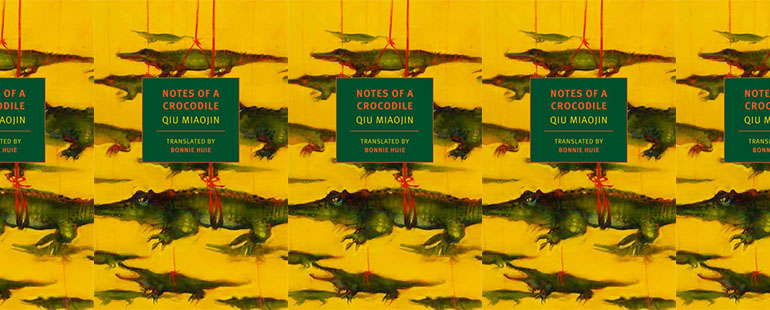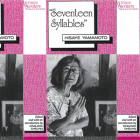Qiu Miaojin’s Groundbreaking Notes of a Crocodile

In 1994, Taiwanese writer Qiu Miaojin published her first novel, Notes of a Crocodile. She was just twenty-five at the time, and the novel crackles with youthful vitality as it relates the semi-autobiographical story of an anonymous “woman who loves women,” eventually nicknamed Lazi, and her band of merry troublemakers as they navigate university life and sexual orientation. Despite or because of her youth, Qiu was daring enough to be the first to portray queer relationships in Asian literature, and Crocodile has become something of a cult classic due to its transgressive nature. It continues to find a wide audience and was first translated into English in 2017 by Bonnie Huie. Its literary merit does not, however, merely rest on its groundbreaking laurels. Crocodile is full of risky and unusual narrative choices that flirt with disaster before ultimately paying off. These gambits allow Qiu to tell a story that had never been told before in her own way and to create a work as relevant today as it was when published.
Structurally, Crocodile consists of eight notebooks filled with short chapters, reproduced letters, movie cues, and a parallel narrative about a talking crocodile—more on that later—and its famously fragmented style is one example of Qiu’s narrative boldness. Quite naturally, the novel begins at the end and goes back in time as Lazi compiles old journals in an attempt to make sense of the last four years of her life. “Each eighty-page notebook is quickly fading, having been filled out in pencil…the first two notebooks…are meager compared to the rest…I had to rely on dwindling impressions, which meant tinkering around it until it sounded right.” In this way, Lazi takes the unusual step of letting us into the difficulties of creating her novel, breaking with the tradition of good writing as effortless. This baring of difficulties, however, is a strength. It gives Crocodile a raw quality, both intimate and truthful, and reinforces Crocodile’s themes at a structural level. The struggle to exist despite loss or damage is central to Qiu’s story and resonates in her novel down to its foundations.
Crocodile’s fragmentation also places a strong emphasis on Lazi’s point of view. It is her story, carried along by her voice. This close first person perspective could be suffocating if Lazi’s voice were not one of Crocodile’s great pleasures—early on, Lazi claims she “didn’t take my driver’s exam seriously enough. Took it four times and failed…even better is that I publicly claim (and perhaps society buys it) to have only failed twice. Whatever, I don’t care.” In her hands, every mundane happenstance becomes interesting and insightful. In a few sentences, we enjoy Lazi’s witty, wry irreverence while also finding out about her failures, her awareness of how society views failure, and her desire to pass off how she feels about her failures. All of this is done so quickly and glibly you might not notice how much is actually going on. Crocodile is full of such passages, and they justify Qiu’s choice to limit our perspective to Lazi’s. She is someone we want to go on a journey with, even as we suspect a crash might not be far off.
Fellow student Shui Ling enters Lazi’s narrative in Notebook #1 and their “clandestine form of dating” seems to ensure a wreck of some kind will take place before too long. “Mutual love” might exist but that “love would be wild, raging, and passionate, but also illicit…it could never develop into anything” according to Lazi. She goes on to communicate poorly, pick fights, and inflict silent treatments in uncomfortable reminders of what adolescent romance can be like. Discomfort, though, is only the first layer of what Qiu has to convey with her depiction of this relationship. The second has to do with a significant quirk of Lazi’s world: there are no adults present.
“The occasional call” is all Lazi mentions of her family, and she is never shown talking to anyone over the age of twenty-six. Her friends also appear to have no contact with adults—unusual for teenagers at a prestigious Asian university—and there is no evidence that they even think about adults. There is simply a void in the text where adults might naturally be. This is an unusual presentation and may appear to be a fault. Surely an adult voice would help to temper the relationship woes that Lazi and her friends experience, and is a standard feature of a coming-of-age story. But Qiu’s literary sleight of hand is, in fact, a deliberate and powerful tactic to show just how isolated Lazi is and what the consequences of that isolation are. There are no adults present because there are no adults who can help Lazi and her friends. Qiu knew that nothing portrays absence quite like absence, and understanding this dynamic is ultimately what transforms frustration with the characters’ dramatics to sympathy for their plight.
As Crocodile continues, another pointed depiction emerges out of Qiu’s repeated pairing of love and violence. “To paint a picture of our embrace, I’d almost have to use her blood and guts”; “He rocked Chu Kuang in his arms, slapping his face lightly”; “Her arms were wrapped around my neck as she said to me, You know, we might die together like this…”; so on and so forth. The intensity of these repeated associations can become difficult to read—which is the exact point. Qiu does not linger on the social consequences of her sexual orientation, but she probably didn’t have to. Crocodile was published at a time when Taiwan was in the grips of a veritable media frenzy around lesbians, culminating in a rash of suicides among unwillingly outed women. Qiu herself would die by suicide at twenty-six, a year after Crocodile’s publication. Against this backdrop, Qiu does not let us look away from the pain that results when love is decoupled from life. She tangentially refers to real life and tells us quite plainly the suffering faced by queer people of that era. We might prefer that Qiu temper her portrayal, but she is purposeful to the last. Her writing, more than portraying suffering, embodies it so there is no safe distance for us to experience it.
About a fifth of the way through the novel, a chapter ends after Lazi’s first night with Shui Ling, and something quite different appears on the next page. Attention shifts to a separate story line involving the titular crocodile, a “human with reptile characteristics,” which has been forced to hide from society because its true nature will not be accepted. The metaphor is clear, though its presence in the novel is still a gamble. It is an unfamiliar element, and alternative plots and fantasy sequences can easily derail a novel’s momentum and a reader’s interest. It soon becomes clear, however, that the crocodile is the right fit for Qiu’s novel. It offers her a way to step outside the restrictions of realism and to spread her wings, or scales as the case may be, to explore new dimensions to her story.
The crocodile’s narrative begins with a newspaper headline and continues to tackle many of the cultural absurdities around the existence of “crocodiles.” In its world, “various crocodile experts had begun to crop up. Every day in the papers there was a new crocodile-related article written by a PhD. A tenured professor signed on to host Focus on Crocodiles.” People are torn between fascination, revulsion, and curiosity about crocodiles and whether they should be allowed to exist, an oddly prescient characterization on Qiu’s part. While Qiu studiously avoided politics and culture in Lazi’s narrative, she takes aim and unleashes on one societal folly after another in the crocodile’s narrative. It is as if she needed fantasy and satire to give her the freedom to tackle these topics head-on. The result is a cathartic release of outrage, and it was absolutely necessary that Qiu find the right vehicle to carry this emotion. As the crocodile dons a “human suit” to make its way in public, Qiu dons a crocodile suit to speak her mind and her anger.
Qiu’s portrayal of the crocodile itself is also telling and significant. The crocodile of her imagination loves cream puffs, dreams of “spend[ing] its Sundays saving lives while at the same time searching for that someone special,” and has a “stuffed crocodile it had made from a dozen handkerchiefs wound together and wrapped with one big handkerchief.” It is, in short, adorable; but even more than that, it is hopeful. Unlike Lazi and her relational destructiveness, the crocodile finds things to love, dreams of what an ideal life would be like, and creates a companion for itself, however paltry. It is the crocodile who goes on to try and find others like itself and to live openly. It may seem contradictory to set this hopeful possibility in a fantasy sequence, but fantasy itself is a vital component of hope. Qiu might be unsure what fate ultimately awaits her main human character, but she is willing to make allowances that a green lizard might one day find a way to be accepted. This encoding of hope with fantasy and creation is in fact present all throughout Crocodile. Lazi with her notebooks, the crocodile with its doll, Qiu with her novel—they are all making what they can out of the available material in the hopes of something better.
In 2019, just twenty-five years after Crocodile’s publication, Taiwan became the first Asian country to legalize same-sex marriage, merging fantasy with reality. Qiu did not live to see that day, but her work remains an indelible tribute to the struggle and tragedy that accompanied the fight for equal rights. It shows us exactly why it is a great thing for a nation to decouple love from anguish. In the novel, Lazi’s intention is to “leave behind some sort of record before… memories evaporate” and one might imagine Qiu’s aim to be similar. As a novel that risks much to say much, Crocodile succeeds on these terms as both testament and novel.
This piece was originally published on January 24, 2020.



